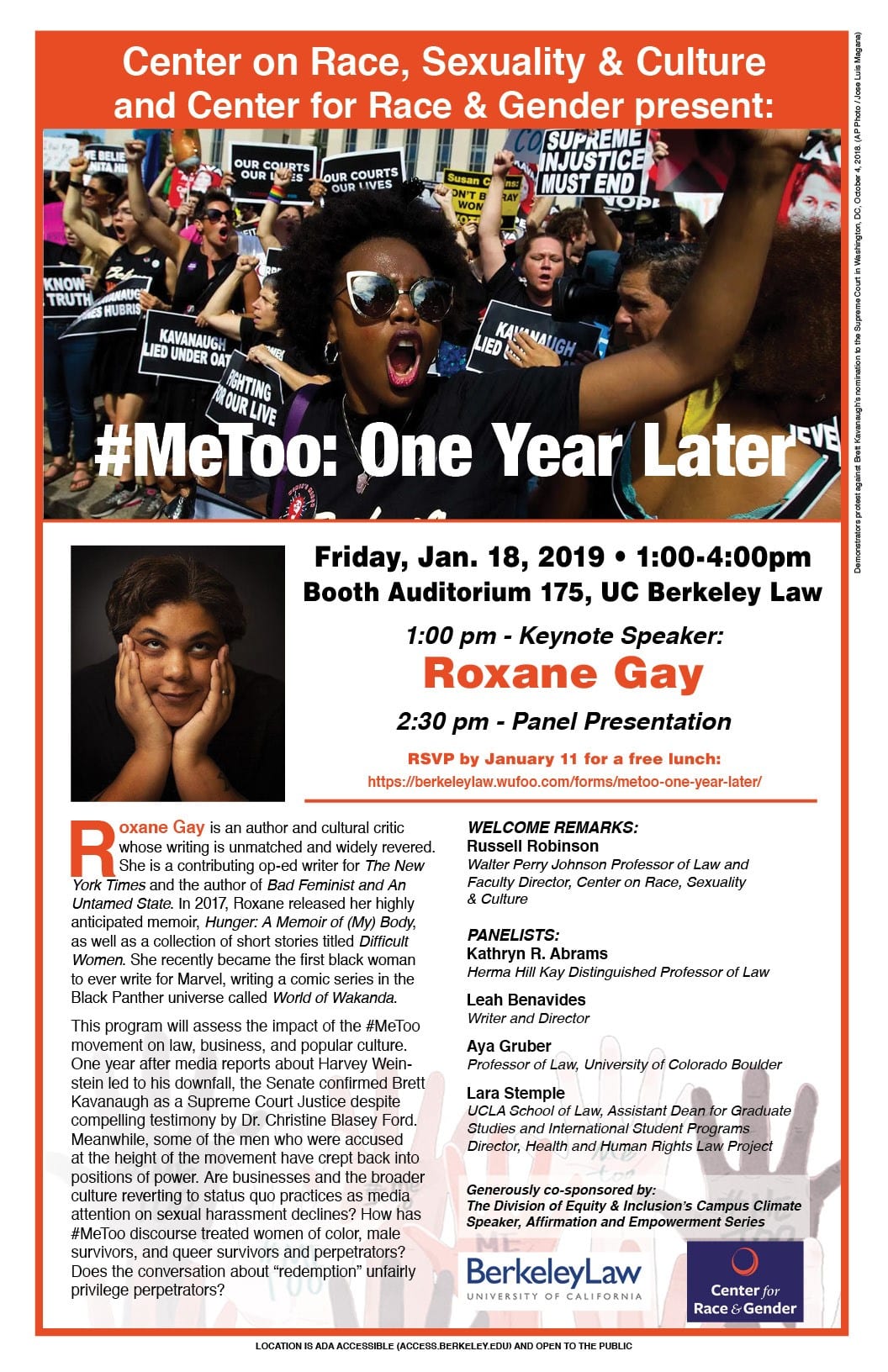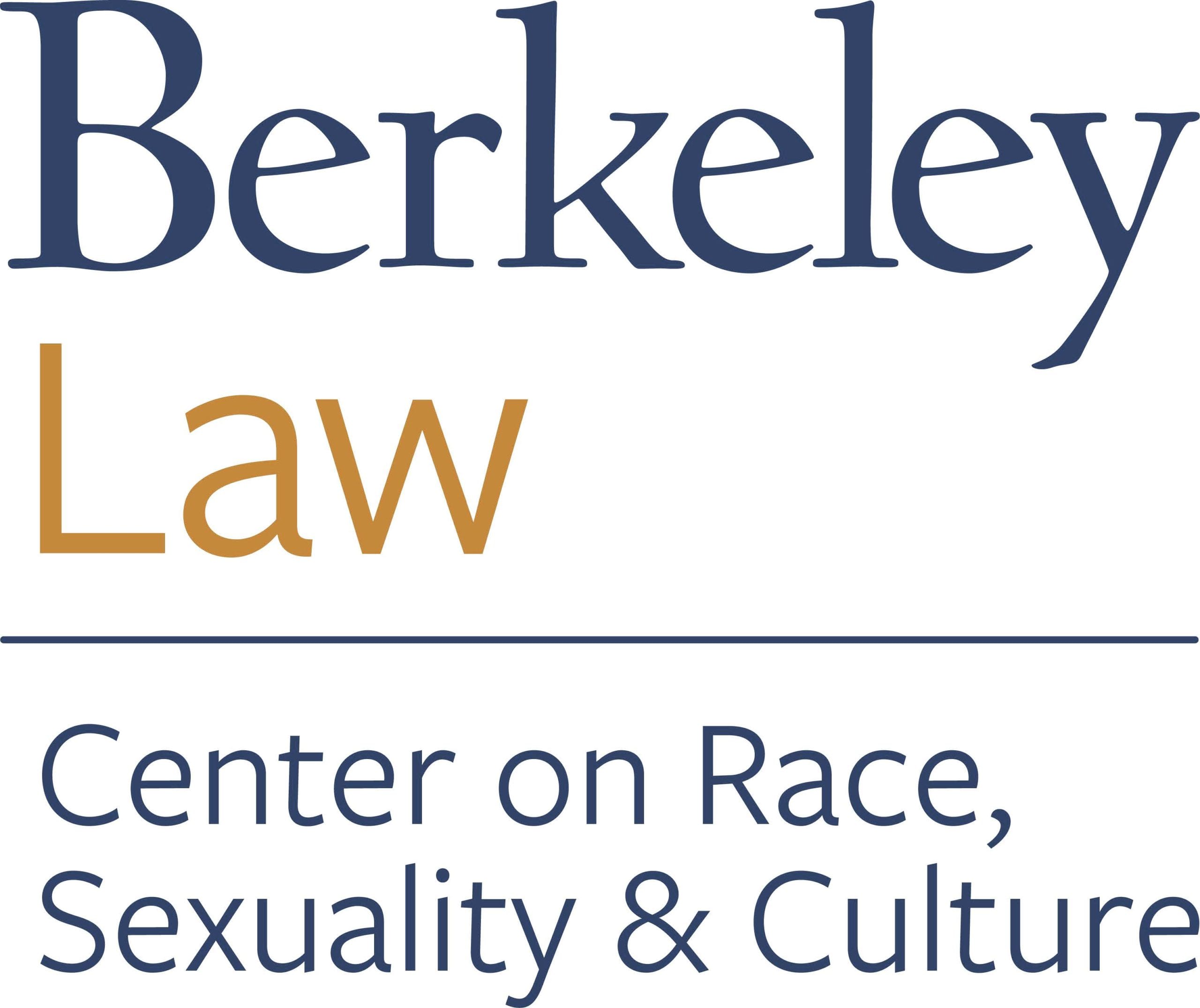Monday, October 21, 2024
12:45 PM to 2:00 PM
*Room 215 (Dean’s Seminar Room), Law Building
Click here to register.
*Livestream on Zoom
Click here to register.
Space is limited. Lunch will be provided on a first-come, first-served basis.
The Center on Race, Sexuality & Culture, the Center on Reproductive Rights and Justice, and the Center for Race & Gender present a lunchtime panel with:
- Kathyrn Abrams
Herma Hill Kay Distinguished Professor of Law, and Faculty Director, Center on Reproductive Rights and Justice, U.C. Berkeley School of Law - Nicole Holliday
Acting Associate Professor, Department of Linguistics, U.C. Berkeley - Russell K. Robinson
Walter Perry Johnson Professor of Law, and Faculty Director, Center on Race, Sexuality & Culture, U.C. Berkeley School of Law - Leti Volpp
Robert D. and Leslie Kay Raven Professor of Law, U.C. Berkeley School of Law, and Director, Center for Race & Gender, U.C. Berkeley - Omar Wasow
Assistant Professor, The Charles and Louise Travers Department of Political Science, U.C. Berkeley
—
*If you require an accommodation for effective communication (ASL interpreting/CART captioning, alternative media formats, etc.) to fully participate in this event, please contact Ariana Ceja at centerrg@berkeley.edu with as much advance notice as possible and at least 7-10 days in advance of the event.
Equality Besieged: A Critical Analysis of Supreme Court Jurisprudence
California Law Review Symposium
Friday, March 1, 2024
9:00 AM to 5:00 PM
Room 100, Berkeley Law
If you cannot attend in person, please click the link below to join on Zoom:
https://berkeley.zoom.us/j/91975224880
With the reversal of Roe v. Wade in 2022, the Justices in the conservative super majority on the U.S. Supreme Court dramatically curtailed reproductive rights and signaled an alarming willingness to abandon precedents that established other critically important rights. In June 2023, the Court rejected affirmative action policies modeled on those approved by the Court in Regents of the University of California v. Bakke and Grutter v. Bollinger. These are just two of several recent decisions that illustrate the tendency of this new Court to undermine, twist, and weaken law and doctrine that for decades have protected members of historically marginalized groups.
At the same time, the Court has “weaponized” the First Amendment to confer novel rights on conservative Christians. For example, in 303 Creative v. Elenis, the Court held that a web designer who opposes same-sex marriage has a First Amendment right to violate state antidiscrimination laws. Some Justices, in particular Justice Alito, have gone so far as to suggest that religious conservatives are the new minorities in need of judicial protection.
These rulings, rhetoric, and the reshaping of doctrine they effect constitute an attack on the laws and principles that have powered progress, however halting and incomplete, toward greater equality of opportunity for people who are members of historically marginalized communities. The conservative Justices have adopted formalistic and ahistorical reasoning in their opinions, and they have often displayed a disregard for the lived experiences of real people (unless they are conservative Christians). Although the opinions of the conservative Justices are at times brazen, their doctrinal moves are often complex and subtle and demand careful analysis. Progressive scholars must closely examine these opinions and develop the critiques, principles, and perspectives that will inform today’s dissents and enable tomorrow’s Justices to revive the Court’s commitment to equality. To advance the rights of subordinated people, progressive lawyers and scholars need a movement comparable in scope and ambition to that undertaken by conservative scholars and lawyers since the 1970s to undo liberal victories achieved during the era of the Warren Court.
We will convene under the auspices of the California Law Review scholars and advocates who have studied, analyzed, and theorized how doctrine and policy may dismantle or reinforce inequality along lines of race, class, sex/gender, sexuality, religion, and disability.
Agenda
Introduction from Professor Jonathan Glater
Welcome from California Law Review
I. Opening Remarks, 9:00 – 10:00 am
Dean Erwin Chemerinsky & Professor Khiara M. Bridges: these scholars’ expertise in equality, the First Amendment, policing, and reproductive justice positions them to provide an insightful overview of the Court’s docket as well as related issues percolating in the lower courts.
II. Panel 1: Equality in Context, 10:15 – 11:45 am
This panel will provide the historical context for recent Supreme Court decisions as well as examine how movements are responding to doctrinal developments, such as organizing in the aftermath of Dobbs.
III. Lunch Keynote Conversation: The State of Racial Equality at the Supreme Court; 12:30-1:45 pm
This conversation, which will be moderated by Russell K. Robinson, will bring together two leading Critical Race theorists, Cheryl I. Harris and Devon W. Carbado. The conversation will engage the law concerning race-conscious admissions processes, policing and race, and the pattern of state laws that attack Critical Race Theory, Diversity, Equity, and Inclusion, and the rights of LGBTQ people, especially transgender children and adults. Harris and Carbado co-wrote The New Racial Preferences, a visionary Cal. L. Rev. critique of “colorblind” admissions, which is even more relevant after the Supreme Court decision in Students for Fair Admissions. Robinson wrote Unequal Protection, which considers similarities and differences between the Court’s treatment of equality claims by people of color, women, and LGBTQ people.
IV. Panel 2: Identities & Intersectionality, 2:00-3:30 pm
This panel will take up intersections between the Court’s treatment of rights in diverse contexts, such as privacy, equality, criminal law, and Native American law. Panelists will juxtapose doctrinal developments that are sometimes studied separately in search of new insights. Speakers will seek to identify trends that cut across different cases to excavate the Court’s broader agenda. Further, with respect to the affirmative action cases in particular, this panel will provide an opportunity to engage the equality interests of African-Americans, AAPI people, Indigenous people, and White people, among other groups.
V. Panel 3: Competing Interests: Equality and the First Amendment; 3:45-5:15 pm
This panel will examine how the Court has increasingly adopted novel constructions of rights of free speech and free exercise that privilege corporations and conservative Christians – but not members of religious minority groups, such as Muslims – and marginalize women, people of color, and LGBTQ people. Panelists will grapple with the question of how can religious liberty be re-imagined so that vulnerable religious minorities receive as much protection as Christians? What would an anti-subordination interpretation of the First Amendment look like?
VI. Closing Remarks, 5:15-5:30 pm
Russell K. Robinson
__________
Sponsored by:
California Law Review
Center on Race, Sexuality & Culture
Co-Sponsored by:
Center for Race & Gender
Education, Equality and the Supreme Court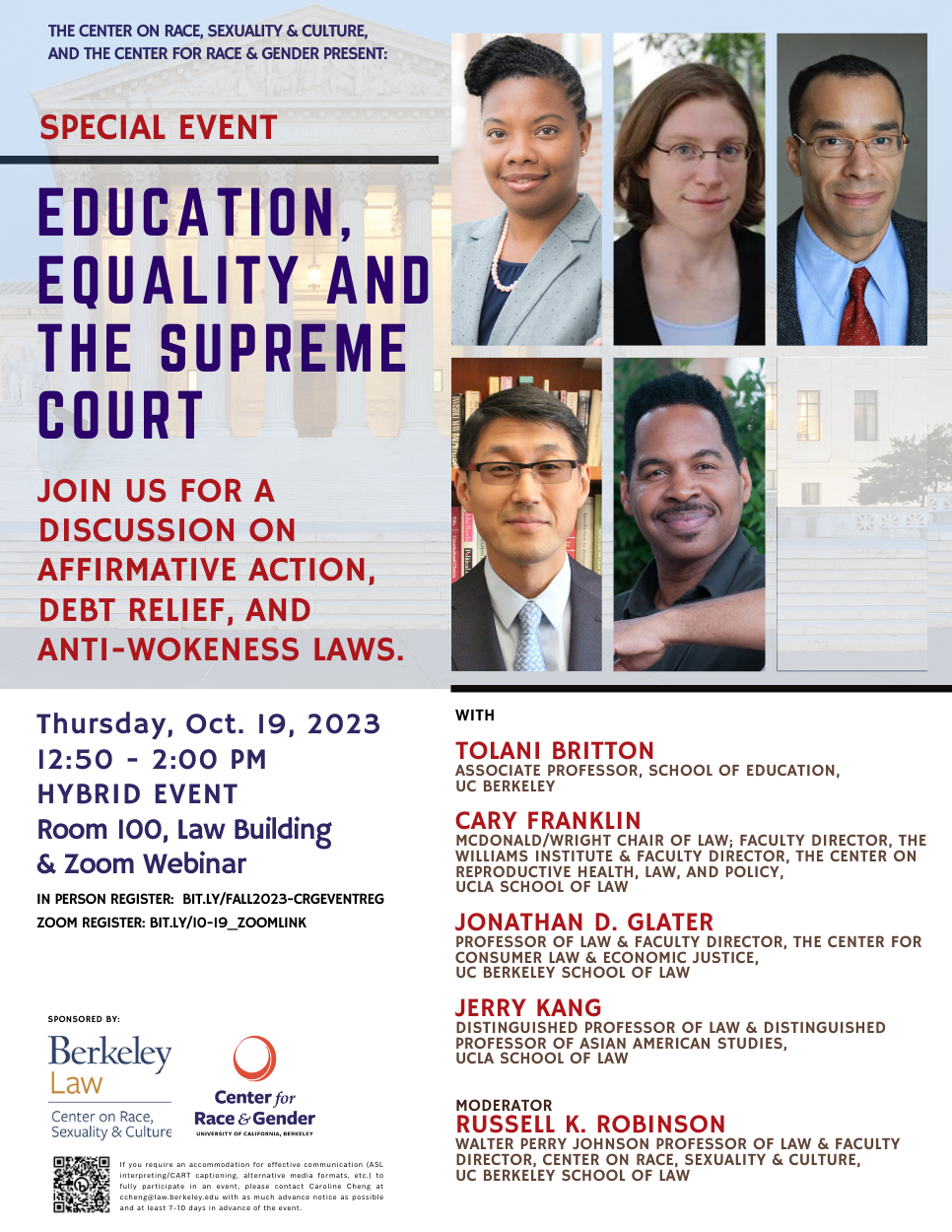
Thursday, October 19, 2023
12:50 – 2:00 PM | Hybrid: Special Event + CRG Sponsored Event
In Person – Room 100, Law Building – Click here to register
Virtual – Zoom – Click here to register
Click here to download the speakers’ and moderator’s biographies.
The speakers will discuss affirmative action, debt relief, anti-LGBTQ, and anti-wokeness laws.
SPEAKERS
Tolani Britton
Associate Professor
University of California, Berkeley
Graduate School of Education
Cary Franklin
McDonald / Wright Chair of Law
Faculty Director, The Williams Institute
Faculty Director, The Center on Reproductive Health, Law, and Policy
UCLA School of Law
Jonathan D. Glater
Professor of Law
Associate Dean, J.D. Curriculum and Teaching
Faculty Director of the Center for Consumer Law & Economic Justice
UC Berkeley School of Law
Jerry Kang
Distinguished Professor of Law
Distinguished Professor of Asian American Studies (by courtesy)
Inaugural Korea Times – Hankook Ilbo Endowed Chair (2010-20)
Founding Vice Chancellor for Equity, Diversity and Inclusion (2015-20)
UCLA School of Law
MODERATOR
Russell Robinson
Walter Perry Johnson Professor of Law
Faculty Director, Center on Race, Sexuality & Culture
UC Berkeley School of Law
Sponsored by:
Center on Race, Sexuality & Culture
Center for Race & Gender
The Aftermath of Dobbs: Putting the Movement for Reproductive Justice in Conversation with the Fight for Trans Justice
Thursday, September 15, 2022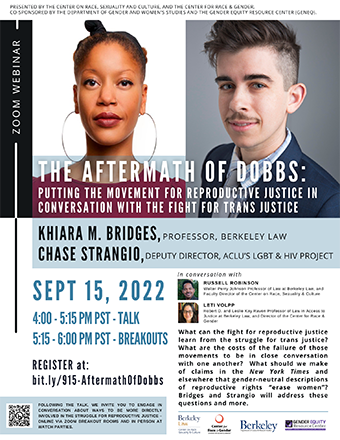
4:00 PM – 5:15 PM – Talk
5:15 PM – 6:00 PM – Breakouts
Zoom Webinar – https://bit.ly/915-AftermathOfDobbs
*Video recording – If you are seeking to access the recording, please email centerrg@berkeley.edu and then be instructed to fill out the “Request for Access” form.
What can the fight for reproductive justice learn from the struggle for trans justice? What are the costs of the failure of those movements to be in close conversation with one another? What should we make of claims in the New York Times and elsewhere that gender-neutral descriptions of reproductive rights “erase women”? Bridges and Strangio will address these questions and more.
Speakers and Moderators
Khiara M. Bridges (Professor of Law, UC Berkeley School of Law) and Chase Strangio(opens in a new tab) (Deputy Director for Transgender Justice, ACLU’s LGBT & HIV Project), in conversation with Russell Robinson (Walter Perry Johnson Professor of Law at Berkeley Law, and Faculty Director of the Center on Race, Sexuality & Culture) and Leti Volpp (Robert D. and Leslie Kay Raven Professor of Law in Access to Justice at Berkeley Law, and Director of the Center for Race & Gender).
Following the talk, we invite you to engage in conversation about ways to be more directly involved in the struggle for reproductive justice — Online via Zoom breakout rooms and in person at watch parties.
Hosted by the Center on Race, Sexuality & Culture at Berkeley Law, and the Center for Race & Gender.
Co-sponsored by the Department of Gender and Women’s Studies) and the Gender Equity Resource Center (GenEq).
Hollywood Roundtable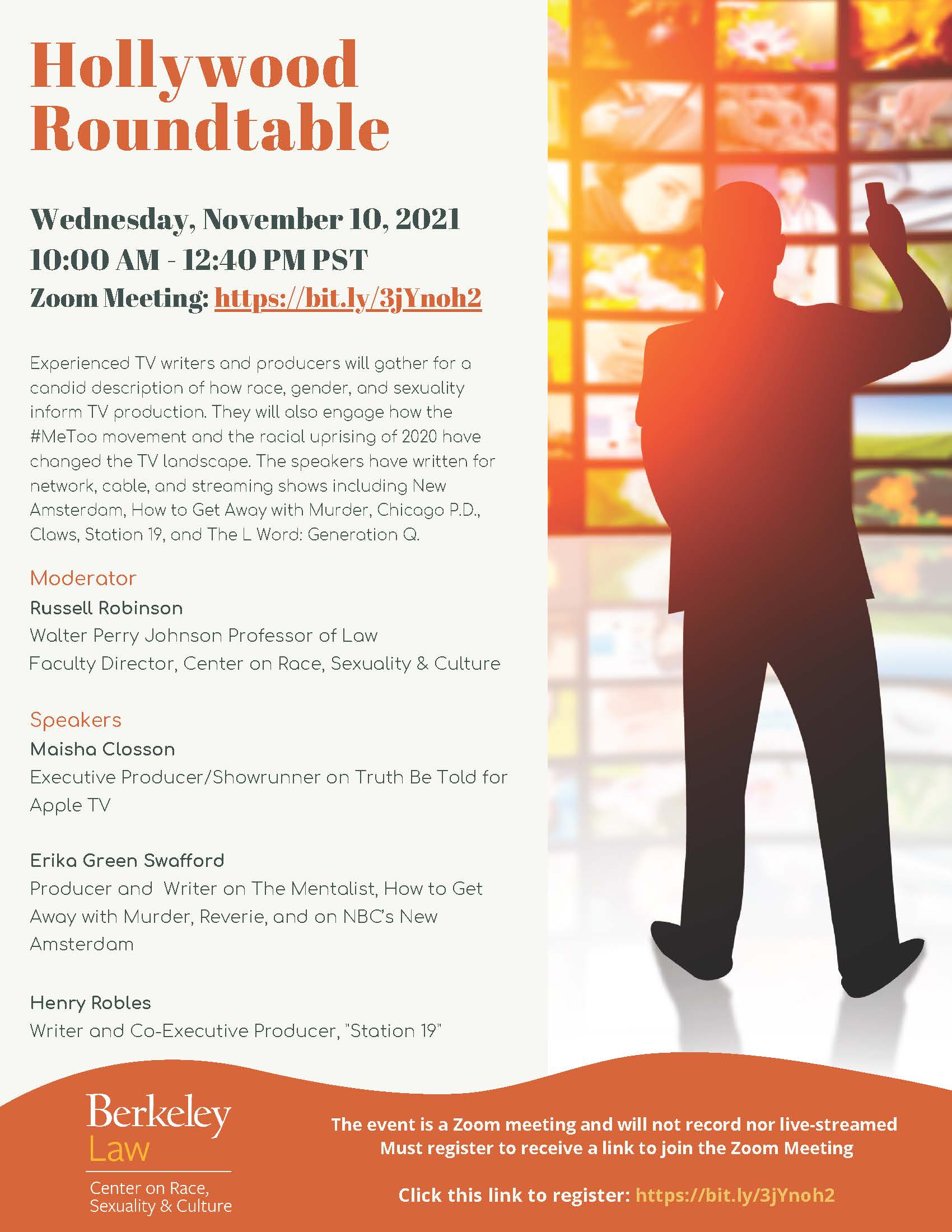
Wednesday, November 10, 2021
10:00 AM – 12:40 PM PST
Experienced TV writers and producers will gather for a candid description of how race, gender, and sexuality inform TV production. They will also engage how the #MeToo movement and the racial uprising of 2020 have changed the TV landscape. The speakers have written for network, cable, and streaming shows including New Amsterdam, How to Get Away with Murder, Chicago P.D., Claws, Station 19, and The L Word: Generation Q.
The event is a Zoom meeting and will not record nor live-streamed. Must register to receive a link to join the Zoom Meeting.
Click this link to register: https://bit.ly/3jYnoh2
Presented by the Center on Race, Sexuality & Culture.
Moderator
Russell Robinson
Walter Perry Johnson Professor of Law
Faculty Director, Center on Race, Sexuality & Culture
Speakers
Maisha Closson
Executive Producer/Showrunner on Truth Be Told for Apple TV
Erika Green Swafford
Producer and Writer on The Mentalist, How to Get Away with Murder, Reverie, and on NBC’s New Amsterdam
Henry Robles
Writer and Co-Executive Producer, “Station 19”
Canceling Critical Race Theory and the “Woke” Agenda: Mapping Racist Backlash Attacks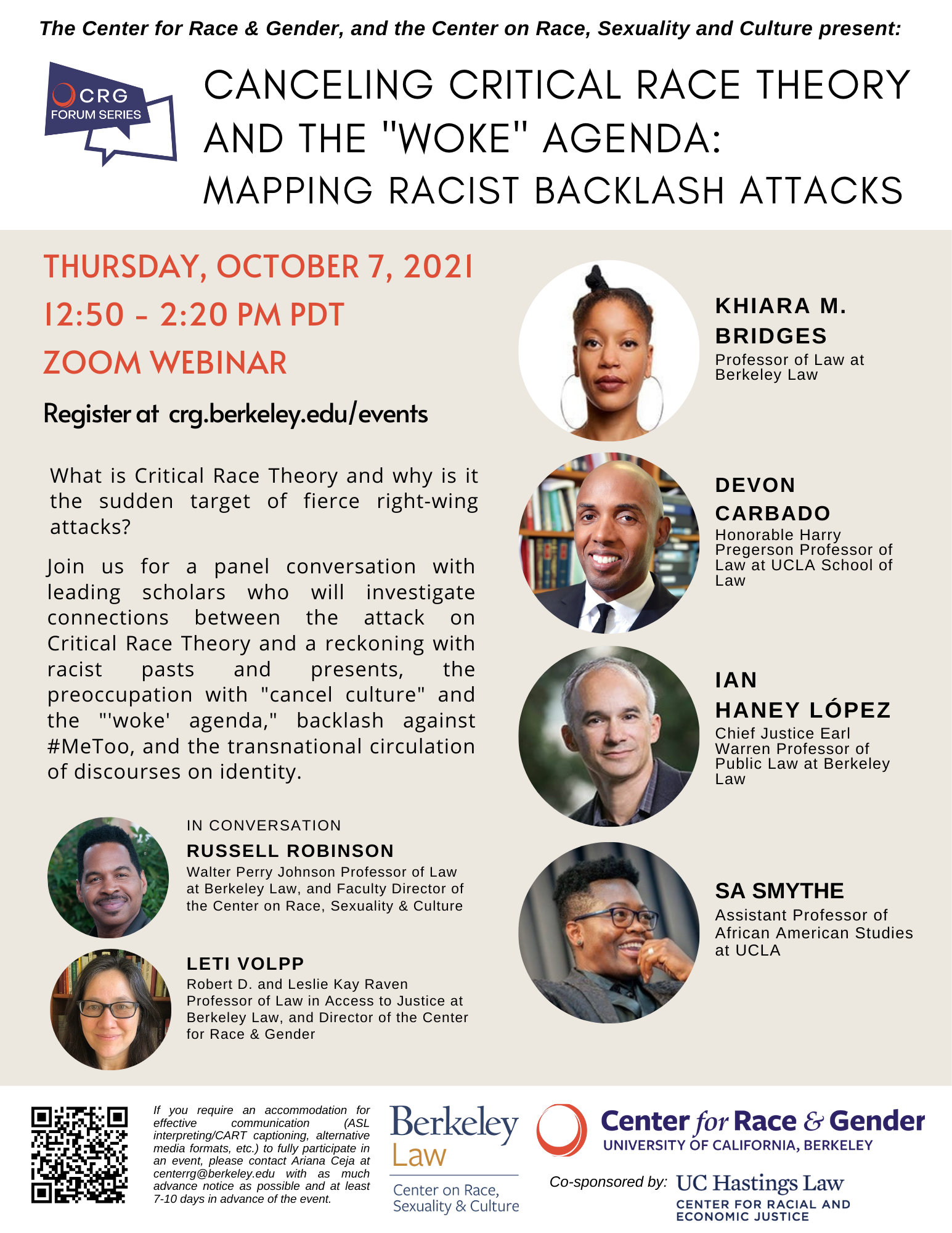
Thursday, October 7, 2021
12:50 PM – 2:20 PM
Zoom Webinar – Click here to register
What is Critical Race Theory and why is it the sudden target of fierce right-wing attacks?
Join us for a panel conversation with leading scholars who will investigate connections between the attack on Critical Race Theory and a reckoning with racist pasts and presents, the preoccupation with “cancel culture” and the “‘woke’ agenda,” backlash against #MeToo, and the transnational circulation of discourses on identity.
Scholars include Khiara M. Bridges (Professor of Law at Berkeley Law), Devon Carbado (Honorable Harry Pregerson Professor of Law at UCLA School of Law), Ian Haney Lopez (Chief Justice Earl Warren Professor of Public Law at Berkeley Law), and SA Smythe (Assistant Professor of African American Studies at UCLA), in conversation with Russell Robinson (Walter Perry Johnson Professor of Law at Berkeley Law, and Faculty Director of the Center on Race, Sexuality & Culture) and Leti Volpp (Robert D. and Leslie Kay Raven Professor of Law in Access to Justice at Berkeley Law, and Director of the Center for Race & Gender).
Event is a Zoom webinar and will not be recorded nor live streamed. Must register to receive a personalized link to join the Zoom webinar.
Presented by the Center for Race & Gender, and the Center on Race, Sexuality & Culture.
Co-sponsored by the Center for Racial and Economic Justice at UC Hastings Law.
Perceptual and Emotional Segregation: The Peril and Promise of Talking Across Identity Lines in 2020
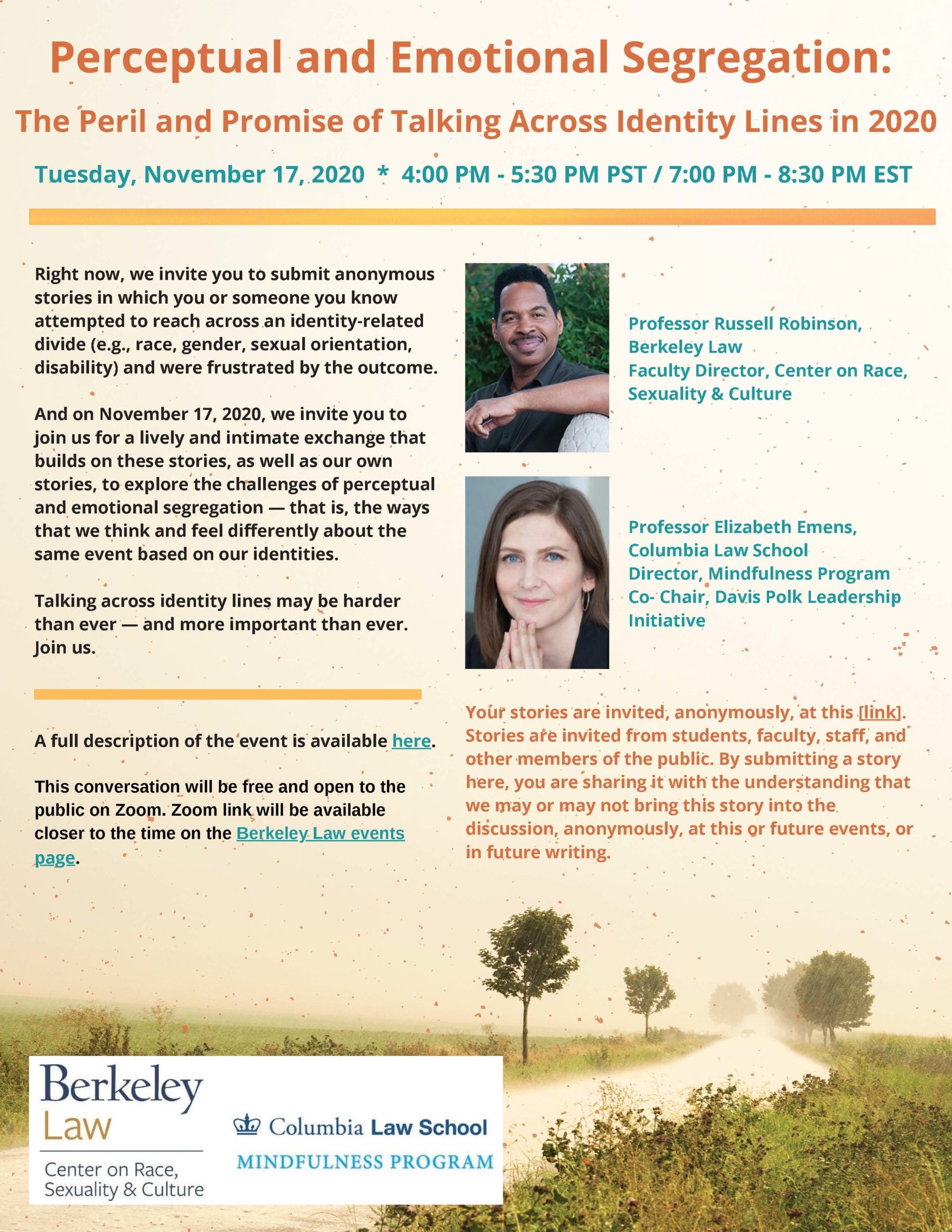
Tuesday, November 17, 2020
4:00 PM to 5:30 PM PST / 7:00 PM to 8:30 PM EST
Click here for more information
We invite you to submit anonymous stories in which you or someone you know attempted to reach across an identity-related divide (e.g.,
race, gender, sexual orientation, disability) and were frustrated by the outcome. We are also interested in the emotions you experienced and
your perceptions of the other person’s emotional state or reaction. We are thinking about the different perceptual biases and emotional needs of the people in conversation: both those from marginalized identities (who may feel, for example, pressure to manage the emotions of people who hold privileged identities) and those who hold privileged identities (who may struggle to find words at all or to grapple with a sense of making mistakes and causing unintended injuries).
A full description of the event is available here. https://www.law.berkeley.edu/event/perceptual-and-emotional-segregation-the-peril-and-promise-of-talking-across-identity-lines-in-2020/
Your stories are invited, anonymously, at this [link]. Stories are invited from students, faculty, staff, and other members of the public. By submitting a story here, you are sharing it with the understanding that we may or may not bring this story into the discussion, anonymously, at this or future events, or in future writing.
Video:
If you cannot attend it live on 11/17, please click here for a recorded video
http://www.kaltura.com/tiny/iw4aw
Critical Race Theory and the 2020 Election
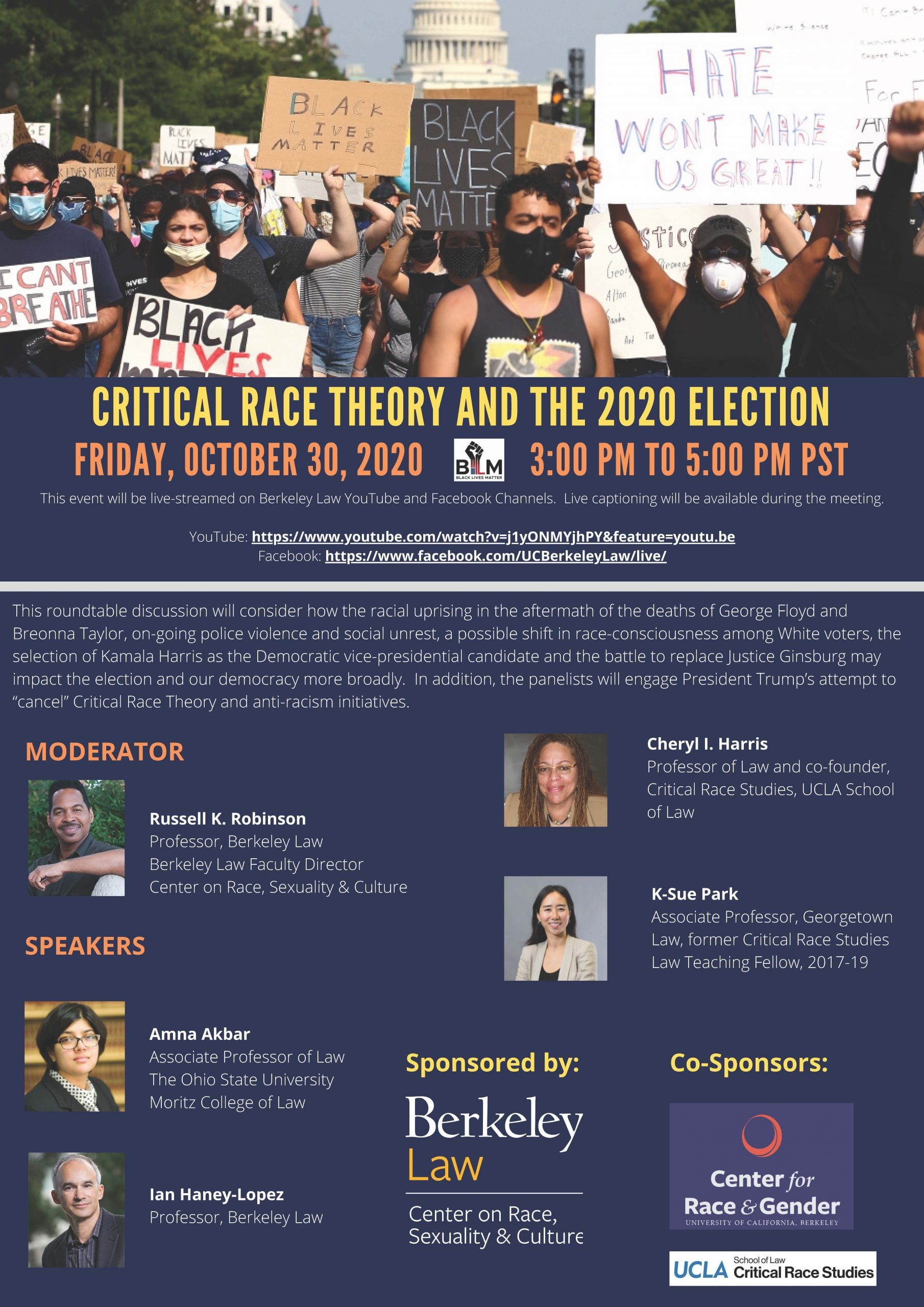
Friday, October 30, 2020
3:00 PM to 5:00 PM PST
Click here for more information
This roundtable discussion will consider how the racial uprising in the aftermath of the deaths of George Floyd and Breonna Taylor, on-going police violence and social unrest, a possible shift in race-consciousness among White voters, the selection of Kamala Harris as the Democratic vice-presidential candidate and the battle to replace Justice Ginsburg may impact the election and our democracy more broadly. In addition, the panelists will engage President Trump’s attempt to “cancel” Critical Race Theory and anti-racism initiatives.
Video:
If you cannot attend it live on 10/30, please click here for a recorded video.
YouTube: https://www.youtube.com/watch?v=j1yONMYjhPY&feature=youtu.be
Facebook: https://www.facebook.com/UCBerkeleyLaw/live/
Friday, January 18, 2019
1:00 PM to 4:00 PM
Booth Auditorium 175, Berkeley Law
This conference will spotlight how harassment and discrimination impact people with a range of different identities, including people of color and LGBTQ people, and examine the extent to which the #MeToo movement has brought lasting change.
Video
Special Lecture by Professors Devon Carbado and Priscilla Ocen on Police Violence and Black Women
Friday, April 6, 2018
1:00 PM to 3:00 PM
140 Moot Court Room, Berkeley Law
Click here for more information
Please join our special make up class on Friday, April 6th from 1:00 pm to 3:00 pm at 140 Moot Court Room.

